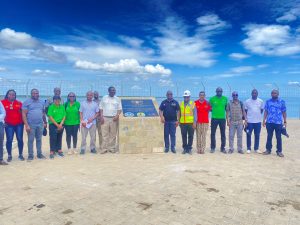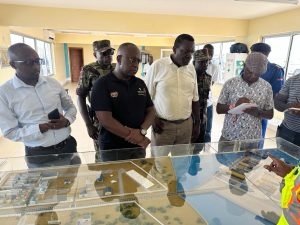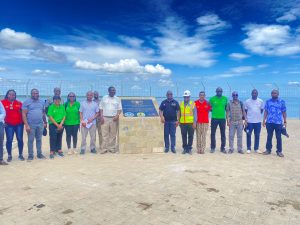NEPAD/APRM Kenya Secretariat has today undertaken, monitoring of the Lamu Port in Lamu County. The visit, which aimed at fostering collaboration and ensuring transparency, saw the convergence of key stakeholders, including the Kenya National Highways Authority (KeNHA), Kenya Ports Authority (KPA), and the Lamu Port-South Sudan-Ethiopia Transport (LAPSSET) Corridor.

The Lamu Port, situated along Kenya’s northern coastline poised to become a pivotal maritime gateway, offering access to regional and international markets.
During the visit, officers from the NEPAD-APRM Kenya Secretariat led by the Chief Executive Officer, Amb. Dr. Samori Okwiya engaged in extensive discussions with stakeholders to assess the progress, challenges, and opportunities surrounding the Lamu Port project. The discussions encompassed various facets of the port’s development, including infrastructure, logistical capabilities, environmental sustainability, and socioeconomic impact.
Amb. Dr. Samori, emphasized the importance of fostering synergy among stakeholders to ensure the efficient and sustainable development of Lamu Port. He stated,
“The Lamu Port holds immense potential to catalyze economic development, enhance trade facilitation, and promote regional connectivity. Collaborative efforts among stakeholders are indispensable in realizing these objectives.”
Key discussions during the visit revolved around infrastructure development, with a particular focus on the integration of road and rail networks to enhance connectivity within the region. Additionally, representatives from KeNHA outlined plans for the construction and upgrade of road networks linking Lamu Port to major economic hubs, facilitating seamless transportation of goods and services.
Moreover, the Kenya Ports Authority provided insights into ongoing initiatives aimed at enhancing port efficiency, including the deployment of state-of-the-art technology and infrastructure upgrades. These efforts are geared towards positioning Lamu Port as a preferred transhipment hub, capable of handling larger vessels and accommodating growing trade volumes.
Consequently, officials from LAPSSET Corridor highlighted the broader socioeconomic impact of the Lamu Port project, emphasizing its role in unlocking the economic potential of northern Kenya and fostering inclusive development across the region. Through job creation, skills development, and the promotion of small and medium enterprises (SMEs), the project seeks to empower local communities and drive sustainable growth.
As the visit concluded, stakeholders reaffirmed their commitment to collaboration and reiterated the importance of sustained momentum in advancing the Lamu Port project.
To sum up, the Secretariat’s monitoring initiative that began at the Lamu underscores the significance of inclusive governance and stakeholder engagement in driving transformative infrastructure projects.





Write a Comment